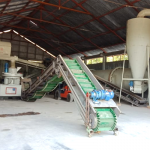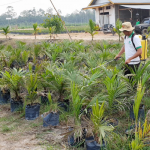Embrace Impact Investing, Bestow the Capital Power of “Precision Poverty Alleviation”
 The origin of Impact Investing can be traced back to 2017 when the Rockefeller Foundation led the proposal of the asset allocation category of Impact Investing, then followed with the rapid growth within 3 years to have been listed as an emerging category in the investment market by JPMorgan Chase in collaboration with the Rockefeller Foundation, to keep pace with loans and stocks. The special position of Impact Investing in the modern financial system has been established since then.
The origin of Impact Investing can be traced back to 2017 when the Rockefeller Foundation led the proposal of the asset allocation category of Impact Investing, then followed with the rapid growth within 3 years to have been listed as an emerging category in the investment market by JPMorgan Chase in collaboration with the Rockefeller Foundation, to keep pace with loans and stocks. The special position of Impact Investing in the modern financial system has been established since then.
Subsequently, on 15th September 2013, the Social Impact Investment Taskforce of G8, led by the British Prime Minister David Cameron, released a report entitled “Impact Investment: The Invisible Heart of Markets – Harnessing the Power of Entrepreneurship, Innovation and Capital for Public Good”. The report urge government and the financial department to release billions of funds from charitable donations, pension funds and private wealth to promote the growth of the social investment market. [i]

One of the social backgrounds for the rise of Impact Investing is the global awareness that sees that the government action or charitable force alone would not be able to provide sufficient financial support to sustainable development in the world. Since then, through public funds inducted by governments, to bring in social capitals and invest into sustainable development projects has become a global consensus.
The special working team led by Sir Ronald Cohen, Chairman of the Global Steering Group for Impact Investment, has defined Impact Investing as “Social Impact Investing is inclusive of Environment Impact. A widespread spectrum of impacts including from charitable career to responsible sustainable investment with Impact Investing staying in the middle.” His statement implies that Impact Investing is an investment in between traditional charitable donations to pure financial returns, with taking into consideration of social impact and financial returns.
The “Duke Agribusiness Fund” established by Duke Capital through an international trustee institution – Anchor WInTrust, that assists the National Federation of Rural Co-operative (Induk KUD) to implement “Smart Agriculture”, and then to promote “Precision Poverty Alleviation” projects, is social enterprise operation model which the objective is to promote sustainable development through Impact Investing. The concept of Share Value, carried by the social enterprise, is advocated by a professor of Howard Business School as well as a well-known strategist Michael E. Porter. The corporate strategy and operation method, not only enhances the competitiveness of the company, but can also improve the economic and social environment of the community in which the company is located. [ii]To promote “Precision Poverty Alleviation”, we need toutilize digital technology to implement “Smart Agriculture”, to “transform and upgrade” traditional agriculture, which along the process, a digital cloud platform that stores the big data of agriculture industry should be established; to install sophisticated smart agricultural sensors as the intelligent brain for traditional agricultural farming; to equip micro-internet-network in remote rural areas with bringing in capital through the support of government policies; all of these enquire huge capital in the early implementation stage. Following two years of dedicated hard work, Duke Capital, in collaboration with the National Federation of Rural Co-operative
(Induk KUD), intends to enter tangible construction stage for various social impact development plans. We hope that our series of investment development projects will be attracting the interest of more funding groups and institutions, to join our journey of “Precision Poverty Alleviation” which is in collaboration with the National Federation of Rural Co-operative (Induk KUD), to expand further and accelerate the concept of social enterprise share value.




